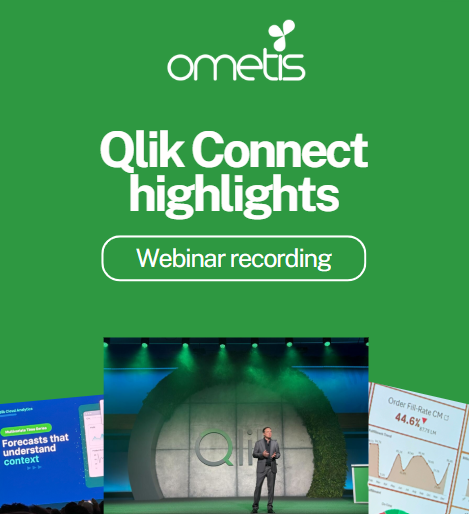Qlik Connect highlights webinar 2025
Our team of five returned from Qlik Connect 2025 in Orlando with insights that signal a major shift in enterprise analytics. As Qlik's #1 Elite Partner in the UK, we've attended every major conference for years—this one felt different.
The Qlik Connect 2025 highlights centre on four game-changing developments: agentic AI capabilities, open lakehouse architecture, enhanced data products, and accelerated cloud migration. Here's what our experts learned and why it matters for UK businesses.
Click on the thumbnail below to access the recording.
Qlik Connect 2025 keynote reveals AI maturity pathway
Neil Thorne, our Head of Business Development, noted four critical trends Qlik executives highlighted during keynote speeches:
- 90% of businesses plan increased AI data readiness spending over 12 months
- 39% of leaders prioritise cloud-based BI tools as key focus areas
- Open data architecture growth driven by Qlik's Upsolver acquisition
- Producer-consumer data gaps remain the biggest analytics challenge
David Tomlins explains agentic AI capabilities at Qlik Connect 2025
David Tomlins from our team attended dedicated AI workshops and noted Qlik's clear AI maturity pathway:
- Descriptive Analytics: 90% of organisations use backward-looking insights with Qlik Sense and QlikView
- Predictive Analytics: Only 50% adopt predictive AI for decision making using Qlik Predict
- Generative AI: 75% plan adoption within two years for content creation
- Agentic Autonomy: Expected in 33% of enterprise applications by 2028
As David explained: "What gets all the headlines is generative creativity, but what's coming now is agentic autonomy."
Discovery agents deliver proactive insights
The discovery agent represents a fundamental shift from reactive to proactive analytics. David observed: "Instead of waiting to ask a question, the agents surface noteworthy findings on their own."
The system continuously monitors data, apps, and usage patterns using Qlik's associative engine and Qlik Predict. When KPIs show decline risk, it proactively alerts stakeholders before issues become critical.
Pipeline agents enable natural language workflows
David noted the pipeline agent's ambitious scope: "Even a non-technical person could describe a business outcome in plain English, and the agent would automatically recommend and design the necessary pipelines."
However, he highlighted realistic challenges: "Generative AI is very good at producing text, but it's not great at adding sums. There's going to be some key challenges for Qlik."
Alex Walker on Qlik Connect 2025 open lakehouse announcements
Alex Walker from our team examined Qlik's open lakehouse architecture, built on their Upsolver acquisition. His key insight: "Open is the way to go with data—trying to lock stuff away is not a great approach."
Technical architecture prevents vendor lock-in
The open lakehouse uses Apache Iceberg table format, built on Parquet files, with storage on Amazon S3. Alex explained: "It's built on technologies that mean people can trust—if they wanted to move away, they wouldn't lose access to that data."
Key advantages Alex highlighted:
- Zero-compute data ingestion reducing costs
- Schema-on-read enabling faster adaptation
- Interoperable source and target systems
- Open technologies preventing vendor lock-in
Simon Blackbourne on data quality innovations
Simon Blackbourne examined Qlik's approach to the producer-consumer gap through three innovations:
Trust Scores: "They work like credit scores. It's a score between zero and five that looks at data validity, completeness, usage and documentation."
Table Recipes: "Visual documentation showing what happens to data—cleaning steps, transformations and modifications so users understand exactly what happened since data was loaded."
Talend Integration: Automated quality checks delivering "six times improvement in faster data preparation."
Real customer ROI from Qlik Connect 2025 case studies
Simon highlighted the maturity of AI implementations: "Companies are getting real tangible value. They can put a monetary sum on it and say this made this much difference."
Support automation delivers 50% ticket reduction
"One organisation using Qlik Answers created a knowledge base for customers. Customers ask questions on the website, Qlik Answers queries the knowledge base, reducing support tickets by 50%."
Manufacturing cuts waste by tens of thousands
"A meat processing company uses Qlik Predict to determine weekly cutting volumes for different meat types. They're reducing waste by tens of thousands of euros."
Food delivery automates operations monitoring
A food delivery company replaced 10 head office staff manually tracking deliveries with Qlik Automate monitoring in real-time with five-minute refresh cycles.
David Tomlins on LLM integration workshops
David attended exclusive workshops on Amazon Bedrock and Snowflake Cortex integration: "A beer company asked 'what's the beer culture in countries where we're selling?' It told you Germany prefers brown ale—adding contextual insights to analytics tools."
He cautioned about security: "You have to be cautious with security—this was just a workshop environment."
Qlik Connect 2025 product rebranding
Qlik AutoML becomes Qlik Predict with enhanced multivariate time series forecasting analysing multiple factors simultaneously—market spend, pricing, seasonality, stock levels.
Qlik Application Automation becomes Qlik Automate simplifying the name whilst maintaining workflow automation functionality.
Ometis expert analysis of Qlik Connect 2025 impact
Simon's key observation: "We're seeing AI coming of age—really valuable with easier usage. We don't need data scientists like we needed a couple years ago."
Neil added: "The question isn't whether agentic AI will change analytics—it's whether your organisation will be ready."
Implementation recommendations for UK businesses
Before adopting agentic AI capabilities:
- Ensure data quality foundations using trust scores
- Build user adoption of current analytics platforms
- Define clear use cases rather than technology-first approaches
Curious about the new Qlik features?
Book a personalised demo to see how agentic AI and open lakehouse architecture can solve your specific data challenges.
Our team can also help with data foundations, cloud migration, or building on your existing Qlik investment..






Comments